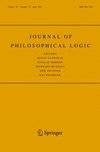条件的最小概率空间
IF 0.7
1区 哲学
0 PHILOSOPHY
引用次数: 0
摘要
条件句理论的核心问题之一是概率空间的构造,在概率空间中,条件句可以被解释为事件和指定的概率。这个问题已经由van Fraassen(23)给出了一个技术公式,他也非常详细地讨论了以Stalnaker Bernoulli空间形式的解决方案。这些空间非常复杂——它们具有连续体的基数,即使语言是有限的。因此,一个自然的问题是,是否可以给出技术上更简单的(特别是有限的)部分结构。本文提出了一种新的解决方案。我们将展示如何构造一个有限概率空间$$\mathrm {S}^\#=\left(\mathrm\Omega^\#,\mathrm\Sigma^\#,\mathrm P^\#\right)$$ s# = Ω #, Σ #, p#,在这个空间中可以解释简单的条件及其布尔组合。该结构在特定的、自然定义的模型类中的基数方面是最小的——一个有趣的副作用是对条件语言中非等价命题数量的估计。我们要求结构满足关于条件的逻辑和语义的某些自然假设,并满足PCCP。这种构造可以很容易地迭代,产生对任意复杂条件的解释。本文章由计算机程序翻译,如有差异,请以英文原文为准。
A Minimal Probability Space for Conditionals
Abstract One of central problems in the theory of conditionals is the construction of a probability space, where conditionals can be interpreted as events and assigned probabilities. The problem has been given a technical formulation by van Fraassen (23), who also discussed in great detail the solution in the form of Stalnaker Bernoulli spaces. These spaces are very complex – they have the cardinality of the continuum, even if the language is finite. A natural question is, therefore, whether a technically simpler (in particular finite) partial construction can be given. In the paper we provide a new solution to the problem. We show how to construct a finite probability space $$\mathrm {S}^\#=\left(\mathrm\Omega^\#,\mathrm\Sigma^\#,\mathrm P^\#\right)$$ S # = Ω # , Σ # , P # in which simple conditionals and their Boolean combinations can be interpreted. The structure is minimal in terms of cardinality within a certain, naturally defined class of models – an interesting side-effect is an estimate of the number of non-equivalent propositions in the conditional language. We demand that the structure satisfy certain natural assumptions concerning the logic and semantics of conditionals and also that it satisfy PCCP. The construction can be easily iterated, producing interpretations for conditionals of arbitrary complexity.
求助全文
通过发布文献求助,成功后即可免费获取论文全文。
去求助
来源期刊

JOURNAL OF PHILOSOPHICAL LOGIC
PHILOSOPHY-
CiteScore
2.50
自引率
20.00%
发文量
43
期刊介绍:
The Journal of Philosophical Logic aims to provide a forum for work at the crossroads of philosophy and logic, old and new, with contributions ranging from conceptual to technical. Accordingly, the Journal invites papers in all of the traditional areas of philosophical logic, including but not limited to: various versions of modal, temporal, epistemic, and deontic logic; constructive logics; relevance and other sub-classical logics; many-valued logics; logics of conditionals; quantum logic; decision theory, inductive logic, logics of belief change, and formal epistemology; defeasible and nonmonotonic logics; formal philosophy of language; vagueness; and theories of truth and validity. In addition to publishing papers on philosophical logic in this familiar sense of the term, the Journal also invites papers on extensions of logic to new areas of application, and on the philosophical issues to which these give rise. The Journal places a special emphasis on the applications of philosophical logic in other disciplines, not only in mathematics and the natural sciences but also, for example, in computer science, artificial intelligence, cognitive science, linguistics, jurisprudence, and the social sciences, such as economics, sociology, and political science.
 求助内容:
求助内容: 应助结果提醒方式:
应助结果提醒方式:


